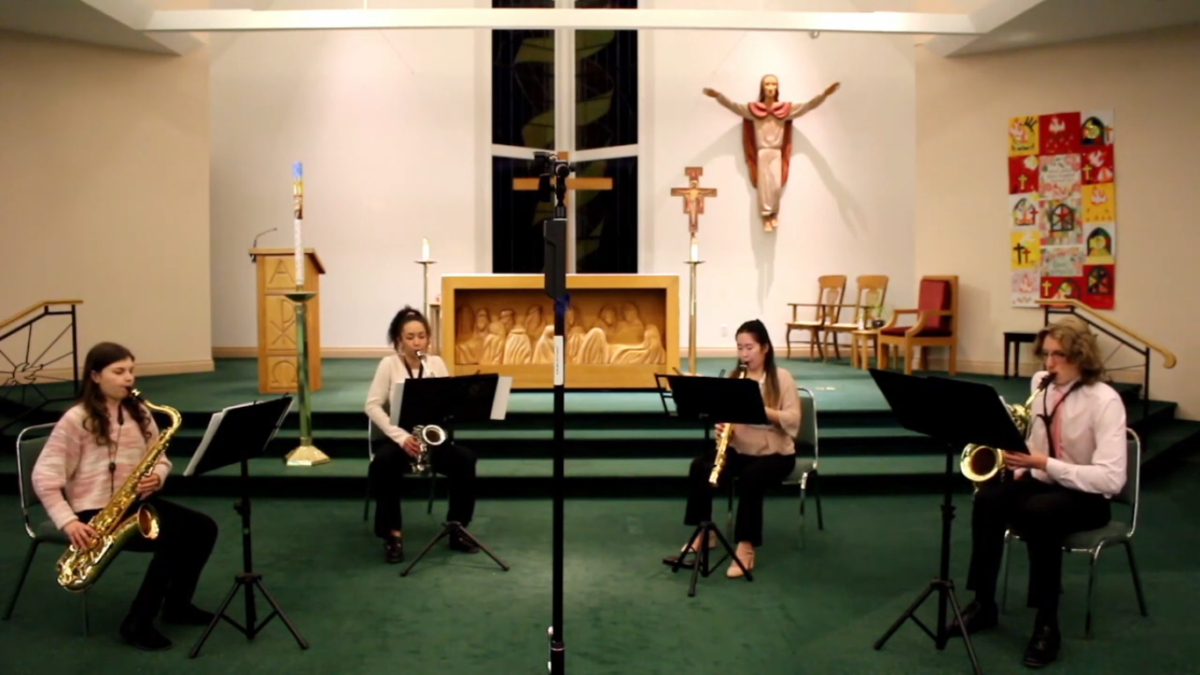“It’s my heritage, and I want to share it”

When the Black Lives Matter movement shook the world last summer, conversations about injustice and inequality often turned to institutions in the public eye, such as government, police, and schools.
But there was also a reckoning facing another industry: classical music. Why were so many textbooks and courses lacking in content about BIPOC composers? How much music had been lost because of their creator’s identity? And how could meaningful work be done to ensure that culturally diverse music becomes the norm at music schools?
These were some of the questions that Baylie Adams, a Black fourth-year saxophone performance major at the UVic School of Music, was pondering last year.
“Over the summer, there were a lot of hard times […] I was just thinking, what can I do? Because obviously it’s my heritage, and I want to share it,” said Adams.
That was when she stumbled across the ‘Dean of Afro-American Composers’, William Grant Still. Born in Mississippi in 1895, Still studied at Wilberforce, a historically Black college, and at the Oberlin Conservatory, where he also worked as a janitor and waiter to pay for his expenses. He became the first Black musician to have a symphony performed by a major orchestra, and yet, despite his achievements and extensive output, many of his works are still waiting to become a part of the classical canon.
“He had the one piece for saxophone, Romance. It’s pretty easy, but it’s really beautiful. And so it can easily be a classic for saxophone,” said Adams.
After learning the piece with Yousef Shadian, her accompanist on the piano, Adams came up with an idea to hold a collaborative recital dedicated to music composed by Still. After finding a suitable recording venue at the Saanich Peninsula Parish, Shadian says that “instead of paying booking fees [the church suggested] we could just donate to the Blue Marist fund.” The Blue Marists of Aleppo are a group in Syria aiming to help Syrians affected by war. So far, the concert has raised $370 for the fund, and Shadian hopes that the concert raises awareness of the situation in Syria.
The pre-recorded recital went live on Youtube in the afternoon of February 21st with 30 people watching the premiere. The music was at times passionate and plaintive, bold and beautiful, as Adams spun out long and breathless melodies on her instrument with Shadian accompanying on the piano. Later, Adams was joined by three colleagues as they performed a saxophone arrangement of Still’s Lyric Suite for String Quartet. Yes, there were elements of blues and Still’s African-American heritage, but it was still distinctly composed in his own voice. Adams and her co-performers proved that, and also provided a compelling case that Still’s music deserves to be heard more.
With the uploaded livestream garnering nearly 200 views, Adams hopes that the concert will have another impact: the long-overdue recognition of Still and other BIPOC composers in classical music institutions.
“I never heard William Grant Still’s name through any classical curriculum that I’ve been in […] he very easily could be within the club,” Adams says. “The only time I ever heard about African American heritage in my music curriculum at UVic was in jazz history.”
Benjamin Butterfield, a voice professor and Temporary Associate Director, agrees that responsibility lies with faculty and administration to create change.
“We have to inspire them to want to do it,” he says. “You cannot get stuck in what you think.”
UVic music students are collectively required to take music history courses spanning from antiquity to the 20th century. The content covered within those courses is entirely at the discretion of the individual instructors who teach them. And since the classical music canon, which is mostly made of works composed by dead white men, is so entrenched in concert repertoire and music history textbooks, this white-racial frame continues to pervade the halls of music school. Although courses on Cuban and Indigenous music are on the UVic calendar, they don’t frequently run.
Change appears to be on the horizon. Last summer, thirty-five students co-signed a letter to the administration “calling for more works of all ethnicities, races, and backgrounds to be regularly scheduled and performed.” Some professors are taking charge and shaping curricula to create a more diverse learning experience for students. Among other examples, Wendell Clanton, a professor, instructor, and Adams’ teacher, says that “South Indian classical music is a vast experience that I try to bring a small part of, currently, to my MUS 270 course, Musicianship and Ear Training.”
Ultimately, the dismantling of a centuries-old system that has upheld works by one specific group of people is a slow process. It is one that, at the UVic level, must involve student and community (particularly BIPOC) voices in order to shape a curriculum that not only teaches a more inclusive history but also opens students to the broad horizon of world musics and teaches them how music can be used as a tool to unite and build communities.
Otherwise, the inevitable will occur, as Clanton puts it starkly: “our institutions that cannot bridge the ‘classical’ world with the world outside our doors are prone, then, to fossilization and isolation and decay.”
“In Appreciation of William Grant Still; A Virtual Benefit Concert” can be viewed here.







